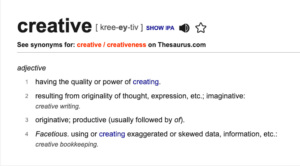There is a lie I see people tell themselves time and time again. It’s hindering their leadership, businesses, careers, and/or enjoyment of life in general. Here it is: “I’m not creative.” It amazes me how frequently people put limits on the term creative—especially because by definition, creative means to think outside of the box! Take a look at this definition from dictionary.com:

Nowhere in that definition are hobbies like painting, photography, interior design, or writing mentioned. You are creative because you were made in the image of the Creator of the universe. Everyone possesses their own unique creative capabilities, and they serve as an outlet to sync up with our God-given nature.
Everything that exists started as an idea. And everyone has ideas all of the time. However, the difference between those who dream and those who do is creativity—the act of bringing something into existence. So, here are 5 steps for how to be more creative:
1. Embrace Your Story
I’ll say it again: if you want to be more creative, the first step is to acknowledge your God-given creativity. If you don’t believe me, I implore you to ask yourself why. Then, consider the unique avenues where your creativity manifests itself. Lastly, you have to let go of any failures.
It’s really easy to let a few mistakes or projects that didn’t quite come to fruition hinder you from getting back in the game. However, when you realize that being creative is who you are—not something you do—there’s less pressure. The sheer fact that you are alive means that you are a walking storybook! Come to understand creativity as a thought process, a way to have fun, and a means of connecting with God rather than a means to an end.
2. Find a Niche (or two, or three…)
Our thoughts are wild, so we have to tame them to some degree. This is what the apostle Paul meant when he encouraged the Corinthian people to take their thoughts captive to obey Christ (2 Corinthians 10:5). In order to have creativity that produces a finished product, you have to submit your thoughts to an idea. This is true for entrepreneurs who need a creative, yet targeted business plan to succeed, and it’s true for abstract artists who have to follow the unwritten rules of their craft.
Finding a niche (a specific environment) can help you construct targeted creative goals. This enhances your chances of success and therefore increases the probability that creativity will become an integrated part of your life. Think: if you have culinary aspirations, what kind of cuisine do you want to cook? If you’re a business person, how can you innovate your daily work processes? If you’re an interior designer, where do you want to specialize?
3. Eat Good Words
The saying, “You are what you eat” doesn’t just apply to food. The kind of content you consume contributes heavily to how you think and, consequentially, what you produce. Once you know your niches, make sure you’re consuming content from those areas. Avariciously study the ways of people who have been successful before you. I always say that success leaves clues!
There are three major things that determine our imagination: our environment, our memories, and the rules we believe about how the world works. So, information influences our imagination! Our creativity hinges on expanding and monitoring what enters our headspace. That’s another reason why it’s so important to read your Bible and other spiritual content daily—it changes our earthly perspective to a heavenly perspective. Our imagination becomes aligned with God’s point of view.
Consider your current information intake. Perhaps you need to go on a content diet — does the creativity you expose yourself to align with your goals? At the very least, does it benefit your headspace? In a world that is so oversaturated with content, the plight of the next generation is going to be learning how to set boundaries and discipline our usage.
[Related: Invest in Yourself to Achieve Greater Success!]
4. Embrace Curiosity
Ask more questions! Pressing into new areas is a great way to get the fresh perspective (and therefore, creativity) flowing. A near-synonym to ‘embrace curiosity’ is to ‘fail forward.’ If you feel dry from lack of inspiration, it could be that you’re not taking enough risks. When we move out of what’s familiar and comfortable, we are forced to use the creative part of our brain more to find solutions!
In addition, when we explore what we don’t understand, we humble ourselves. We place ourselves in the position of a learner, not an expert. This is not only a great space to learn how to be more creative; it’s also a great place to ask God to come fill in the gaps!
In his article What Christians Miss When They Dismiss Imagination, Douglas Estes writes:
”Imagination, rightly understood, is a way of knowing—it sits between our senses, our experiences, our memory, and our heart, our intellect, our will. In order for us to know God well, and know our world well, we must engage our imaginations to inform our thinking and our actions.”
In other words, God gifts us with divine revelation when we seek out in imaginative spaces. Psalm 36:9 (ESV) says it this way: “For with you is the fountain of life; in your light do we see light.”
5. Develop a System
Great systems always know how to strike a balance between art and science. Systematic beauty is all around us—just look at a compelling piece of architecture, a rushing waterfall, or even your own hand! Each one of those examples has an entire invisible network beyond what the eye can see.
Similarly, your ideas need a system in order to get out of your head and into reality. If you’re a writer, you need to understand marketing. If you’re a business manager, you need to be an expert in job outlines and work descriptions. Basically, every creative pursuit needs a vehicle to transport it into the world. For many people, this isn’t the fun part. But just remember that in order to do what you love to do, you have to do a lot of what you don’t like to do. In other words, when you reach a certain level every passion requires a measure of sacrifice. I would say that I hate to see good ideas get lost due to a lack of systemization, but then again I wouldn’t know because I never get to see them!
[Related: 3 Steps to Developing a Business System]
Lastly, to develop a creative system you have to create the space. This step is simple, but it’s not easy. Anything and everything will fight to take your creative space away from you, and only you can protect it. Devote whatever time is needed to complete your projects, but sanctify some no-time as well. This is time you set aside with absolutely no agenda at all. Imagination thrives on no-time because there are no other demands present to crowd it out! Daydream, let subconscious thoughts rise to the surface, and try to hear what God might be trying to speak to you.
[Related: How to Rest: 4 Reasons Leaders Need to Chill Out More]
Did these steps inspire you to be more creative this week? Please, let us know how you press into creativity in the comments!



